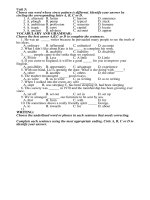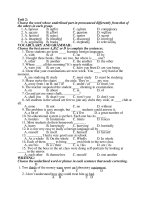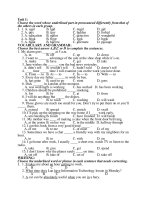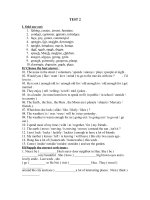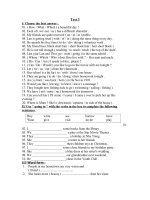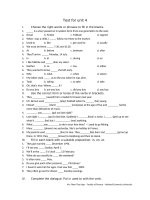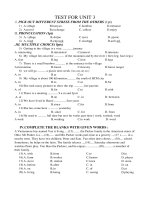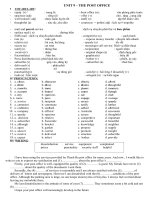TEST FOR UNIT 13 pptx
Bạn đang xem bản rút gọn của tài liệu. Xem và tải ngay bản đầy đủ của tài liệu tại đây (94.26 KB, 11 trang )
TEST FOR UNIT 13
I. Circle the word that has the underlined letter(s) pronounced differently from
that/ those of the others.
1. photo form of fiction
2. orphan enough cough neighbour
3. magazine thousand scientist musical
4. zone amaze busy seizure
5. century picture cinema silent
6. actor violent story listen
7. character change cheerful achieve
8. high sigh weight laugh
II. What word or phrase is being defined?
1. A person who performs in films. _______ actor______
2. A play or film, and part of the story is sung to music __________________
3. A person who makes films. __________________
4. The people who watch a film. __________________
5. A part of a film __________________
6. A person in a film. __________________
7. Th.
most important actors in a film. __________________
8. A movie in which voices and other __________________
sounds are not heard.
II. Complete the passage with the suitable words from the box.
comments comic director combined character
moustache knight silent funny big
Charlie Chaplin (1889-1977) was an English film actor and (1) who did most
of his work in the US. Most people consider him the greatest comic actor of the (2)
cinema. He appeared in many of his films as the hest-known (3) he created, a poor
man with a small (4) and trousers and shoes that are too (5) for him, causing
him to walk in a (6) way . He made many short (7) films, such as The Kid
(1921), and several longer films, such as City Lights (1931) and Modern Times (1936),
which (8) comedy with social and political (9) He was made a (10) in
1975
IV. Choose the correct word.
1. At first I thought Jake was an interesting/ interested guy. but tonight I somewhat
borin
g
/ bored with his company.
2. She has really learnt very fast. She has made astonishing/ astonished progress.
3. it was very disappointin
g
/ disappointed not to get the job.
4. Philip was exceptionally annoying/ annoyed at Joanne's behaviour.
5. 1 thought the program on wildlife was fascinating/ fascinated. I was absolutely
fascinating/ fascinated.
6. We were thrilling/ thrilled to hear your good news.
7. It was really terrif
y
ing/ terrified experience. Afterwards everybody was very shocking/
shocked.
8. The journey took all day and night. They found it very tiring/ tired:
9. Did Tim feel fri
g
htening/ frightened when he saw the snake at his feet?
10. Why do you always look so boring/ bored. Is your life really so boring/
V. Read the conversation between Alice and her friend, Jake. Complete it with the
correct form of the words in parentheses. Choose between -ed and – ing participial
adjectives.
Alice : That was a very (1) (interest) movie. What did you think?
Jake : To be honest. I found it kind of (2) (bore). I'm not that (3)
(interest) in science fiction.
Alice : Really? I find it (4) (fascinate). What kind of movie do you enjoy?
Jake: Mostly comedies. Have you seen Home. Again?
Alice: Yes, but J wasn't (5) (amuse) at all. In fact I thought it was (6)
(horrify). The story line was (7) (confuse), and I couldn't find any humor in
the characters' problem. When Hell the theater, I felt kind of (8)
(depress).
Jake : I'm (9) (amaze) that you felt that way! I thought it was very (10)
(amuse).
Alice : Well, I guess it's a matter of taste.
Jake : Speaking of taste, would you like to get a bite to eat?
Alice : Thanks, but it's late and I'm (11) (exhaust).
VI. Choose the correct answer.
1. 'Do you think Margaret will take the job you offered her'?' 'I don't know. She seemed
…… in it, however.
a. interest b. interesting. c. interested d. interestingly
2. 'The students all went to the circus yesterday.' I heard it was really
a. amused b. amusing c. amuse d. amusingly
3. was that Jan couldn't come to the party.' 'Her boss made her work overtime.'
a. disappointing b. disappointedly
c. disappoint d. disappointed
4. 'What a terrible football game!' I thought it was
a. delightful b. delighting c. delight d. delighted
5. 'How we are to hear that you got the scholarship!' `Thank you. It was really a
surprise.'
a. pleasing b. pleased c. pleasingly d. please
6. 'Professor Allen's class is the best I have ever been to." I think it's a. the most
boring b. the most boringly c. the most bored d. most bored
7. 'I can't believe that Jim is marrying the vice-president's daughter.' `That they would get
married is …….
a. surprised b. surprisingly c. surprising d. surprise
8. 'How does Jane like her new car? 'She's ………. with it.
a. delighted b. delighting c. delight d. delightful
9. 'This handmade cloth is beautiful.' 'To see such quality is
a. pleasing b. please
c. pleased d. so pleasantly
10. 'You look nervous.' This thunder makes me……….
a. scary b. scare c. scaring d. scared
11. 'The cabaret was amusing' `Claire was certainly She couldn't stop laughing.'
a. amuse b. amused c. amusing d. abusive
12. I think the way Jessica behaved was quite "Yes, I think so.'
a. shock b. shocked c. shocking d. shockingly
VII. Rewrite the following sentences, using It was not until
1. No one could leave the stadium until 2.30.
_____________________________________________
2. She weren't allowed to open her presents until her birthday.
_____________________________________________
3. We didn't have any holiday until last summer.
_____________________________________________
4. She didn't stop learning German until the age of 24.
_____________________________________________
5. I couldn't finish my project until Mark helped me.
_____________________________________________
6. I didn't sleep until midnight.
_____________________________________________
7. They didn't pay the bill until the electricity was cut off.
_____________________________________________
8. I couldn't comment further until I had all the information.
_____________________________________________
VIII. Put in a/ an or the where necessary. Leave an empty space (-) if sentence is
already complete.
1. I don't usually like staying at hotels, but last summer we spent a few days
at very nice hotel by sea.
2. tennis is my favorite sport. I play once or twice week if I can, but I'm not
very good player.
3. I won't be home for dinner this evening. I'm meeting some friends after
work and we're going to cinema.
4. unemployment is very high at the moment and it's very difficult for
people to find work.
5. There was accident as
.
I was going home last night. Two people were
taken to hospital. I think most accidents are caused by
people driving too fast.
6. Carol is economist. She used to work in investment department of
Lloyds Bank. Now she works for American bank in United States.
7. A: What's name of hotel where you're staying?
B: Imperial. It's in Queen Street in city center. It's near
station.
8. I have two brothers. older one is training to be pilot with British Airways.
younger one is still at………. school. When he leaves school, he
hopes to go to university to study law.
IX. Choose the correct answer to fill in each blank.
1 . 'Look outside. sky is getting very dark.' `I hope there isn't going to be a storm.'
a. A b. The c. θ d. Some
2. I'd like to invite him to dinner next week, if that's OK with
a. a b. the c. θ d. an
3. 'I'm going out for a walk. Have you seen my shoes?' 'Yes, they're on floor in
kitchen.'
a. a/ the b. the/ the c. a / a d. the/ a
4. 'Do you see the video store? I was sure it was on Main Street.’ I think it's on
side street. but I'm not sure which one.'
a. the/ the b. the/ a c. a / θ d. θ /a
5. 'Would you like ice cream? There's one in fridge.' 'Thanks.'
a. an/ the b. an/ a c. θ / the d. a/ the
6. °We'd better go. We've been here for hour.' 'That was fastest hour I've
ever spent.'
a. a/ the b. an/ the c. an/ a d. θ / the
7. Don't forget we're meeting on Friday for lunch.
a. a/ a b. a/ θ c. θ / the d/ θ / θ
8. 'I've got headache. I've had it all day' 'Why don't you go to
health center? It's open until six.'
a. a/ a b. θ / the c. a/ the d. a/ θ
9, 'I've got some problems with my phone bill.
Can 1 see someone about it?’ Yes, go to fifth floor, lift is along the corridor.'
a. the/ A b. the/ The c. θ! A d. the/ θ
10. 'Excuse me. I'd like to rent new game.” Here you are. Sega Genesis. Please
take it to cashier over there.'
a. al the b. the/ the c. θ / the d. a/ a
X. Read the passage carefully, then choose the correct answers.
From as early as the 1920s millions of Americans were moviegoers. In the
beginning, movies had simple plots and were quickly over. Often they lasted only fifteen
minutes. The first Western, The Great
.
Train Robbery, had three small scenes - a train
robbery, a pursuit on horseback, and a surprise ending where the crook pointed his gun at
the movie audience and fired.
During the 1900s, Hollywood and New Jersey were competitors for the movie
industry. New Jersey was desirable because so many actors and actresses worked on
Broadway, which is near New Jersey. However, all filming had to take place outside
where the light was strong enough. As a result, Hollywood, nestled in the hills of sunny
southern California, became the better choice for year-round filming.
By the 1920s, Hollywood films became a booming industry. Actors such as Charlie
Chaplin were making S 10,000 per week instead of a few dollars per day on Broadway.
Directors began producing longer movies with more placated plots. In time, Hollywood
stood for films and the rich people who starred in them.
1. According to paragraph 1, what kind of movies were being produce: the general
general public?
a. Slow-moving and silent films
b. Short movies with simple story lines.
c. Black and white movies
d. Movies that were filmed outdoors.
2. According to paragraph 2, what was the main reason that Hollywood, came a prime
location for making films?
a. Many actors and actresses worked there.
b. All films had to take place outside.
c. Southern California has a year-round sunny climate.
d. The city government promised a tax break if movie companies relocated.
3. According to paragraph 3, what did Hollywood come to symbolize?
a. The film industry and its glamorous movie stars.
b. The center of Broadway entertaining.
c. The ultimate vacation spot for the rich.
d. A ideal place for film makers.
4. It can be inferred from the passage that
a. in the future, Hollywood will produce longer and more expensive works.
b. nowadays, movies attract more audiences than plays.
c. Hollywood movies are admired by audiences all over the world.
d. before the rise of the film, Broadway was the place where actors each become
famous.
5. According to the passage, which of the following is true?
a. New Jersey was attractive because great actors worked on road
b. Because of its sunny weather, Hollywood became the capital of film m: By the
1920s, film makers earned more money than actors.
d. Hollywood had an enormous influence on the American culture.
TEST FOR UNIT 13
I. PRONUNCIATION .
A. Choose the word that has the underlined part pronounced differed" from that of
the others.
1 . a. audience b. laugh c. August d. taught
2. a. silent b. film c. thriller d. situation
3. a. century b. picture c. fiction d. question
4. a. enough b. tough c. cough d. thou gh
5. a. scene b. detective c. century d. adventure
B. Choose the word whose main stress is placed differentl
y
from that of the others.
1. a. history b. audience c. cinema d. existence
2. a. develop b. discover c. introduce d. prepare
3. a. disaster b, voyage c. luxury d. character
4. a. adventure b. detective c. disgusting d. violent
5. a. cartoon b. fiction c. terrify d. interest
II. VOCABULARY AND EXPRESSION
Choose the word or phrase - b, c, or d - that best completes the sentence or
substitutes for the underlined word or phrase.
1. Chaplin's movies captivated throughout the world.
a. scientists b. musicians c. directors d. audiences
2. There's a love story in it, and it's very funny. I suppose you'd call it a
a. horror film b. detective film c. romantic comedy d. thriller
3. Steven Spielbera is one of the famous . He has made lots of films including
jaw, Jurassic Park, Schindler's List, etc.
a. stars b. directors c. actors d. script 'writers
4. The film is two Women who drive across America
a. on b. of c: about d. over
5. The main is played by Nicole Kidman.
a. actress b. character c. director d. film maker
6. Silence of the Lambs is a film. It makes the audience scared.
a. disaster b. science fiction c. action d. horror
7. The film is the 1940s, during the Second World War.
a. made for b. based on c. set in d. occurred in
8. Phantom of the Opera is a popular musical written by AndreLloyd Webber.
a. play or film in which there are a lot of songs
b. part of the story performed by musicians
c. series shown on television or the radio
d. play performed by singers and orchestra
9. The movie Schindler 's List was on the novel Schindler c Ark written by the
Australian write Thomas Keneally.
a. based b. depended c. played d. performed
10. Charlie Chaplin is considered as the greatest comic actor of the
a. musical cinema b. commercial film
c. romantic comedy d. silent cinema.
III. GRAMMAR AND STRUCTURE
A. Choose the word or phrase a, b, c, or d - that best completes sentence.
1. She thought the film far to children.
a. violent enough to show b. so violent that not to show
c. too violent to snow. d. too violent not to show
2. There's an film on at the local cinema.
a. interest b. interesting c. interested d. interesting;.
3. We went to last night.
a. a awful film b. an awful film c. the awful film d. awful film
4. They've just started a film of the novel.
a. shoot b. shot c. shooting d. being shot
5. The film after weeks of protest by religious groups.
a. was finally released
b. finally released
c. finally have released
d. was released finally who the music was by.
6. We stayed for the film credits
a. for seeing b. in order see c. seeing d. to see
7. Frank works as .
a. a security guard at a film studio.
b. a security guard at film studio.
c. the security guard at the film studio.
d. security guard at a film stud.
8. This film tells the remarkable story of actor.
a. a disabled b. the disabled c. disabled d. an disabled
9. The movie was so that we couldn't sleep last night.
a. thrill b. thrilling c. thrilled d. thriller
10. It's hard to tell with Alice. Her mood are always very
a. surprise b. surprised c. surprising d. being
surprise:
11. There isn't airport near where I live. nearest airport is -miles away.
a. a/ The b. an/ The c. the/ The d. the! A
12. This young director four films so far. His recent film Oscar for Best
Director.
a. made/ won b. has made/ has won c. made/ has won d. has made/
13. 'You look when you see ine.'"Yes.1 think you are in China.'
a. astonish b. astonishing c. astonished d. astonish
14. It was not until one was found the search for a star
a. will stop b. would stop c. didn't stop d. wouldn't stop
15. The actress couldn't attend the awards ceremony so she had a representative the
award for her.
a. accept b. accepted c. accepting d. acceptance
B. Identify the one underlined word or phrase - A, B, C or D that must be changed
for the sentence to be correct.
1. Some movie fans can't separate fantasy from reality and confused an actor with the
character he
A B C
plays
D
2. We're always amazing by John's incredible travel stories.
A B C D
3. Moviemaker combines several separate processes.
A B C D
4. The comedian worked hardly to entertain the children in the hospital.
A B C D
5. The critic's description of the film made it sound very appealed.
A B C D
6. Part of the entertainment of seeing a movie is understanding how the director
combination a range
A B C
of different styles to attain an artistic goal.
D
7. The movies are one of the most popular forms of entertainment.
A B C D
8. It was not until they had seen the movie stars the crowd outside the movie would not
disperse.
A B C D
9. The film's representation of world poverty through the character of hungry child was
quite
A B C
moving
D
10. The actors left the hotel separately in order avoid attracting a lot of attention.
A B C D
IV. SPEAKING
Choose the most appropriate phrases or sentences that best complete the
conversation.
A: (1)
B: No, I don't like them very much. I think they're so violent. (2)
A: They're OK. (3)
B: Well, I like romantic films and science fiction films.
A: (4)
B: Well, it's difficult to say. But I suppose I prefer romantic films.
A: (5)
B: Julia Robert. I really like her.
A (6)
B: He's OK. But my favorite .actor is Mel Gibson.
A Me too. There's a new Mel Gibson movie at the Elmwood Theater. (7)
B: Great!
1 . a. Do you like films? b. Do you like action films?
c. Which film do you like? d. How do you like action
2. a. Do you?
.
b. Like you?
c. How are you? d. How do
3. a. What film do you like best?
b. What would you like?
c. What kind of film do you like?
d. What sort of film you like?
4. a. Do you prefer romantic films or science fiction film?
b. Which you like best: romantic films or science fiction film?
c. Which do you prefer' romantic films or science fiction film?
d. Do you like romantic films or science fiction film?
5. a. Who's your favorite actress?
b. Who are the best actress?
c. Which actress you like best?
d. What's your favorite actress?
6. a. Have you ever seen Tom Cruise?
b. Do you like Toni Cruise?
c. Is Tom Cruise the actor you like'?
d. How about thinking of Tom Cruise?
7. a. Why not to go to the cinema?
c. What about tonight?
b. Let's et) to see it tonight.
d. Do you like to see it tonight?
V. READING COMPREHENSION
A. Choose the correct words or phrases that best complete the passage.
The popularity of the movies began early in the 20th century and continues today.
People of all ages find movies (1) Movies are a worldwide phenomenon, as the
internationalism of movie distribution has helped to (2) ideas around the globe.
One movie can quickly influence other movies. But why are movies so popular'?
Movies are a kind of storytelling. They try to describe an idea or record an
observation about our- culture. These (3) are recorded using moving visual images.
Some movies portray the situation accurately and realistically, whereas other movies find
visual symbols to (4) those situations.
On the most simple level, movies are a secession of (5) images. These
successive mages are captured on film. Directors film a wide of shots long, medium,
and close up - to create a visual composition. The visual images, along with plot,
characterization, and sound, produce the desired narrative: The shots are joined together
in any number of combinations in a (7) called editing.
Making a film is a massive, complex, and expensive task that (8) art and
'bossiness. Making a movie the talents of hundreds, and some-times thousands, of artists,
producers, and business people. It can take months, even years, for a film to be (10)
into a movie theater.
1. a. thrilling b. entertaining c. terrifying d. amusing
2. a. break b. change c. disperse d. show
3. a. descriptions b. combinations c. observations d. introductions
4. a. influence b. record c. replace d. represent
5. a. move b. moving c. moved d. movement
6. a. row b. range c. series d. line
7. a. process b. product c. progress d. project
8. a. connects . b. describes e. combines d. contains
9. a. involves b. developes c. attains d. touches
10. a. released b. moved c. delivered d. sent
B. Choose the correct answers.
Up to about 1915, movies were short and programs were Made up of several
works. Then, D. W. Griffith and others began to make longer films that provided the
same powerful emotional appeal as did melodrama and presented spectacles far beyond
what the theater could offer. Consequently, after World War I increasing numbers of
spectators deserted the theater for the movies. This trend was accelerated in the late
1920s as a result: of two new elements. In 1927 sound was added to the previously silent
film, and thus one of the theater's principal claims to superiority vanished. In 1929 a
serious economic depression began. Since audiences could go to the movies for a fraction
of what it cost to see a play, theater going became a luxury that few could afford,
especially as the depression deepened.
By the end of World War II, the American theater had been reduced to about thirty
theaters in New York City and a small umber of touring, companies originating there.
1. One thing that movies could do better than the theater was to
a. provide longer programs. b. provide emotional appeal.
c. provide more melodrama. d. provide greater spectacle.
2.
Up to the 1920s one objection to film was that
a. they were too short. b. they were silent.
c. they were too expensive. d. they did not tell a complete
3. One thing that made people choose the movies over the theater was
a. World War I.
b. the fact that films were less expo
c. the fact that films were silent.
d. the fact that films were shorter.
4. By the end of the World War II,
a. theater had become entertainment for the masses.
b
.
. the theater was no longer considered a luxury.
c. professional theatrical performances were confined mainly to New York
d. There were no theatrical performances outside of New York City.
5. When the author of this paragraph says 'this trend was accelerated in late 1920s% he
means that
a. many more people went to the theater than to the movies.
b. the shift away from the movies to the theater was slowed down.
c. the popularity of the theater was gradually increasing.
d. the shift away from the theater to the movies was speeder up.
VI. WRITING
Choose the sentence which has a similar meaning to the sentence printed before,
1. The film's ending is dramatic.
a. The end of the film is a drama.
b. The film has a dramatically
c. The film ends dramatically.
d. The end is filming dramatic-
2. The clown amused the children.
a. The clown had the children amusing.
b. The children found the clown
c. The clown made the children amuse.
d. The children were amusing the clown.
3. The film didn't come up to my expectation.
a. The film wasn't as good as I expected.
b. I expected the film to be longer.
c. The film didn't end as I expected.
d. I expected the film to be released sooner.
4. The film excited us all a lot.
a. The film had a lot excitement.
b. We were exciting about all of the film.
c. The film made all of us feel a lot of excited.
d. All of us were excited about the film.
5. It doesn't matter to them which film they go to,.
a. They never go to the movie whatever film is shown.
b. They don't mind which film they go to.
c. They like seeing every film they go to.
d. Which film they go to matters more than the cost.
